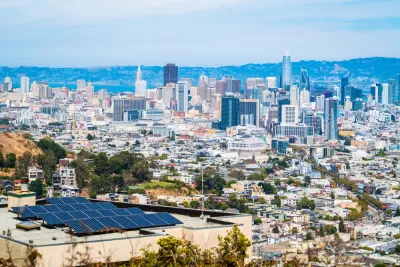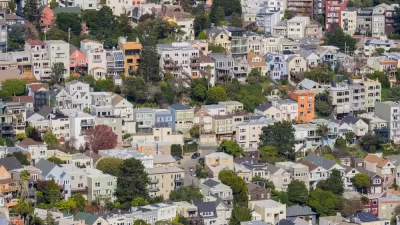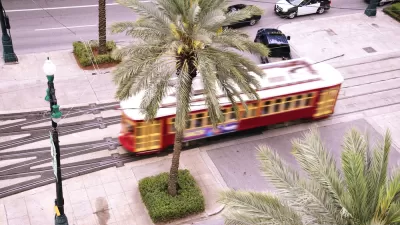An opinion published recently by the San Francisco Chronicle offers a provocative thought exercise: How did the Bay Area of 2070 achieve affordability, equity, sustainability and adaptation in the face of climate change, and new levels of prosperity?

Sarah Karlinsky, senior advisor at SPUR, pens an opinion piece for the San Francisco Chronicle [paywall] that lays out an ambitious vision for the San Francisco Bay Area. In a creative twist, Karlinsky imagines writing from the year 2070—when the Bay Area is thriving with sustainable transportation, affordable housing, and the demise of the systemic racism in the built environment.
According to Karlinsky's imagined future history, 2021 would prove a watershed moment for the Bay Area, emerging from the COVID pandemic with optimism but realizing that all was not well:
The process of change, according to Karlinsky, happened in 2022:
The events of this invented history include additional legislation that loosened zoning restrictions of housing in suburban locations. "Small apartment buildings, granny flats and affordable housing became the new suburban norm," according to Karlinsky.
Other reforms and innovations that helped changed the course of California's evolution include property tax reform, expanded funding mechanisms, a streamlined permitting system, electric buses, restored wetlands, all electric buildings, a second Transbay tube, freeway removal (removed in 2027), and a "green necklace" of parks around the Bay Area as a buffer from wildfires.
The first step is the hardest, explains Karlinsky, but it's possible. "We can live in a region that is affordable, sustainable, racially just and easy to get around. But to get there, we have to believe such a future is possible and insist that our elected leaders make that vision a reality."
FULL STORY: Greetings from 2070. The Bay Area is thriving. Here's how we staved off dystopia

Alabama: Trump Terminates Settlements for Black Communities Harmed By Raw Sewage
Trump deemed the landmark civil rights agreement “illegal DEI and environmental justice policy.”

Study: Maui’s Plan to Convert Vacation Rentals to Long-Term Housing Could Cause Nearly $1 Billion Economic Loss
The plan would reduce visitor accommodation by 25% resulting in 1,900 jobs lost.

Planetizen Federal Action Tracker
A weekly monitor of how Trump’s orders and actions are impacting planners and planning in America.

Wind Energy on the Rise Despite Federal Policy Reversal
The Trump administration is revoking federal support for renewable energy, but demand for new projects continues unabated.

Passengers Flock to Caltrain After Electrification
The new electric trains are running faster and more reliably, leading to strong ridership growth on the Bay Area rail system.

Texas Churches Rally Behind ‘Yes in God’s Back Yard’ Legislation
Religious leaders want the state to reduce zoning regulations to streamline leasing church-owned land to housing developers.
Urban Design for Planners 1: Software Tools
This six-course series explores essential urban design concepts using open source software and equips planners with the tools they need to participate fully in the urban design process.
Planning for Universal Design
Learn the tools for implementing Universal Design in planning regulations.
Caltrans
Smith Gee Studio
Institute for Housing and Urban Development Studies (IHS)
City of Grandview
Harvard GSD Executive Education
Toledo-Lucas County Plan Commissions
Salt Lake City
NYU Wagner Graduate School of Public Service





























